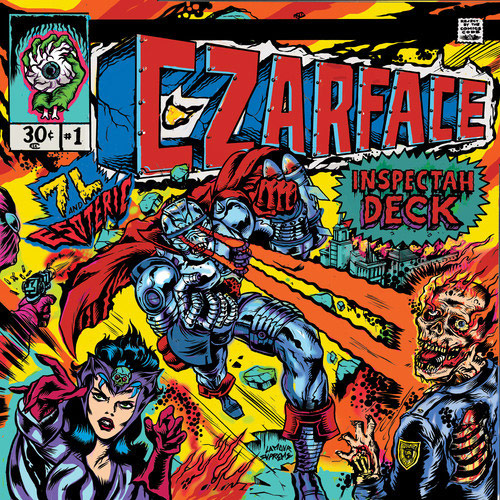Wu-Syndicate - "Bust a Slug" (Wu-Tang Records, 1999)
In my recent post on the Wu-Tang Clan and live
instrumentation I wrote briefly about
The
Swarm, the first of three Wu-Tang Killa Bees compilations the illustrated
the Wu brand’s diminishing returns in the late nineties and early 2000s.
There are some throwaways throughout
The
Swarm’s sixteen songs, but for the most part it’s a great introduction to
many of the Killa Bees. Some of the artists who provided these highlights (The
Beggaz, Ruthless Bastards) never got the chance to put out albums due to
financial mismanagement at Wu-Tang Records, while others (Black Knights of the
North Star, A.I.G.) never lived up to their potential on subsequent releases.
None of the new artists featured on the record sounded like they could ever
surpass the Clan, but a few of them carved out effective careers of their own,
although some of these careers were extremely brief.
Wu-Syndicate fits this latter description exactly. The group
self-released one single under the name Crhyme Syndicate in 1996, but it unsurprisingly
didn’t get much attention.
Somehow, this 12” found its way into the hands of the RZA, who signed them to
Wu-Tang Records in time to include the b-side “Where Wuz Heaven” on
The Swarm. Produced by DJ Devastator, “Where
Wuz Heaven” is a great slice of ghetto life story song with a plaintive guitar
sample, a ghostly soul vocal sample on the chorus, and great rapping from
Myalansky.
The group changed its name to Wu-Syndicate, presumably as a way of helping it
get more attention by making its affiliation with the Clan more explicit.
“Where Wuz Heaven” appeared two more times, first as the a-side
on the first single credited to Wu-Syndicate and again as the seventh song on
the group’s self-titled debut album, released on Wu-Tang Records in 1999.
Wu-Syndicate is a good artifact of
nineties New York street rap, but the group struggles in a few respects. First
and most importantly, the group never fully transcends its direct influences.
DJ Devastator, who handles most of the album’s production,
is so indebted to RZA and Havoc that his beats lack personality on many of the
tracks, even when his production is quite good. Myalansky, Joe Mafia, and
Napoleon (who isn’t listed on the album cover but is part of the group) are all
good MCs, but like most of the second-string Killa Bees they don’t quite have
the personality or distinct enough personalities to anchor a whole album. As a result,
the album’s eighteen songs blend together after a while. When a Wu-Syndicate
song pops up on shuffle, I almost never skip it, but when I put on the whole
album it’s far too easy to tune it out. The second half of the album suffers
more than the first by default, since Wu-Syndicate fatigue isn’t really a
problem until after “Where Wuz Heaven” passes around the album’s midpoint.
Still, there’s one extremely bright spot near the end of the album that demands
attention even if you’ve lost interest in what Wu-Syndicate is serving up: “Bust
a Slug,” the album’s second single.








